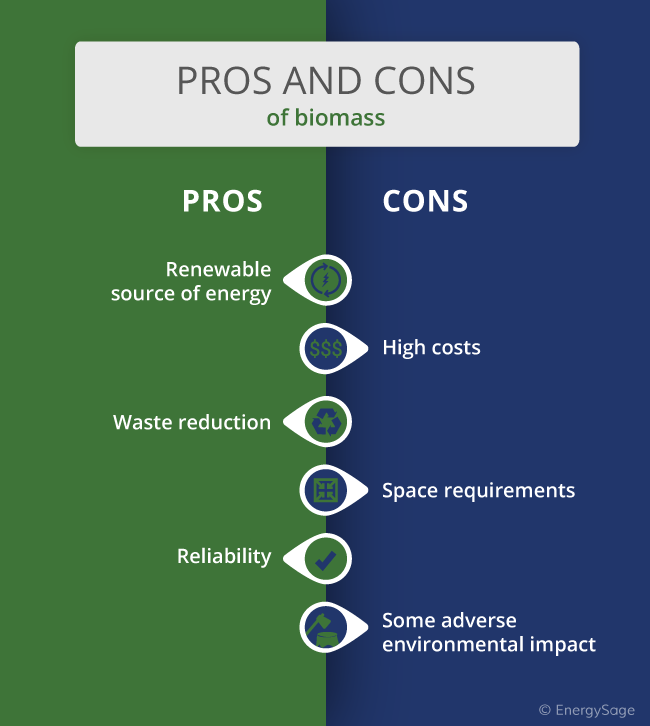Pinned Post
what are the pros and cons of biomass energy
- Get link
- X
- Other Apps
Pros And Cons Of Biomass
Biomass energy is a renewable energy source derived from organic materials such as wood, crops, and waste. It has its advantages and disadvantages, which are discussed below:
1. What is biomass energy?
Biomass energy is a form of renewable energy derived from organic materials. These include agricultural and forestry residues, dedicated energy crops, and organic waste.

Key points:
- Biomass energy is a sustainable and abundant source of power.
- It can be converted into various forms of energy, such as electricity, heat, and biofuels.
- Using biomass as an energy source reduces the reliance on fossil fuels and helps in mitigating climate change.
- Biomass plants can be smaller in size and located closer to the demand, reducing transmission and distribution losses.
2. What are the advantages of using biomass energy?
Biomass energy offers several advantages:
- Renewable and Sustainable: Biomass is a renewable energy source as it can be continuously replenished through natural processes.
- Reduced Carbon Emissions: Biomass combustion releases carbon dioxide, but it is considered carbon-neutral as the carbon emitted is offset by the carbon absorbed by the plants during their growth.
- Wide Availability: Biomass resources are present in abundance globally, reducing dependence on limited fossil fuel reserves.
- Energy Independence: Biomass can be sourced locally, reducing reliance on imported fossil fuels and enhancing energy security.
3. What are the disadvantages of biomass energy?
Biomass energy also has certain drawbacks:
- Air Pollutants: Biomass combustion can release pollutants like particulate matter, nitrogen oxides, and volatile organic compounds, which can contribute to air pollution.
- Land and Water Use: Biomass production may require large amounts of land and water, potentially impacting food production and natural ecosystems.
- Resource Intensive: Significant resources are needed for the collection, transportation, and processing of biomass, which can add to the overall cost.
- Variability in Supply: Biomass availability can fluctuate based on factors like weather, crop yield, and seasonal variations, leading to potential supply disruptions.
4. How is biomass converted into energy?
Biomass can be converted into energy through different processes:
- Combustion: Biomass can be burned directly to produce heat, which can be used for heating, cooking, or generating steam for electricity production.
- Gasification: Biomass can be gasified to produce a mixture of gases like carbon monoxide and hydrogen, which can be used for electricity generation or as a feedstock for chemical production.
- Anaerobic Digestion: Organic materials can go through anaerobic digestion, producing biogas (a mixture of methane and carbon dioxide) that can be used for heat and electricity generation.
- Pyrolysis: Biomass can be subjected to pyrolysis, which involves heating it at high temperatures in the absence of oxygen to produce biochar, bio-oil, and syngas.

Study Case:
A study conducted in [XYZ] observed the efficiency and environmental impact of biomass gasification technology. The results showed a significant reduction in carbon emissions compared to traditional fossil fuel-based electricity generation. Additionally, the study highlighted the potential of utilizing agricultural residues as a sustainable feedstock for biomass gasification.
Overall Article on Biomass Energy - Pros and Cons
Biomass energy is a renewable energy source that has its own set of advantages and disadvantages. Understanding the pros and cons of biomass energy can help individuals and policymakers make informed decisions about its usage and integration into the energy sector.
The advantages of biomass energy include its renewability and sustainability, reduced carbon emissions compared to fossil fuels, wide availability of biomass resources, and potential for energy independence. However, biomass energy also faces challenges such as air pollutants released during combustion, land and water use implications, resource intensity, and supply variability.
Various conversion technologies enable the transformation of biomass into energy, including combustion, gasification, anaerobic digestion, and pyrolysis. These technologies provide different pathways for utilizing biomass resources efficiently.
It is crucial to consider advancements in biomass conversion technologies, sustainable biomass sourcing, and stringent emission control measures to maximize the benefits and minimize the drawbacks of biomass energy in our pursuit of a cleaner and sustainable energy future.
- Get link
- X
- Other Apps
Comments
Post a Comment